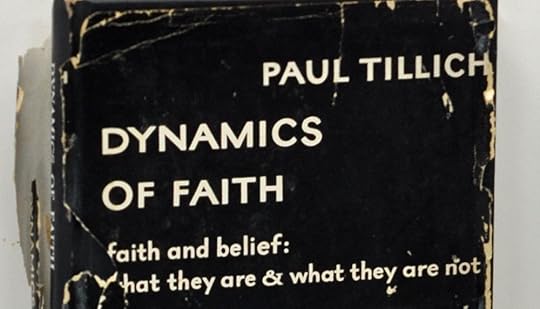The Sublime and Monstrous Faces of Faith

Next month I start a four-week online event called The Omega Course: Adventures in Religionless Christianity. Each week we’ll be exploring an alternative approach to faith than the one we have likely grown up with. To do this, I’ll be introducing people so some important dissident thinkers with subversive ideas. As part of the course everyone will get something to read each week, some it hard to get, and I’ll be giving a life lecture online. In my next few posts I just want to introduce you to some of the ideas well be exploring.
In the first week we’ll be exploring Paul Tillich’s notion of faith from Dynamics of Faith. In this book Tillich offers up an interpretation of faith that places it at odds with what we associate with the word “religious”.
For Tillich, faith is a word that describes ultimate concern. Ultimate concern meaning the human attachment to something that becomes all consuming and all important. Faith is then a form of excessive attachment that goes beyond what can be explained in purely utilitarian terms. We can see this type of ultimate concern everywhere from the greatest love stories to the child who resolutely refuses to eat her vegetables.
Faith is neither inherently a good for Tillich nor something restricted to a certain religious worldview. Faith is a human reality that marks everyone whether they identify with theism, atheism, the sacred, or the secular. It is a human reality that has both a beautiful and monstrous manifestation.
The monstrous side of faith is expressed in any ultimate concern for something that isn’t ultimate. For something that is finite and limited and graspable. For instance, one can express faith for Nation. When someone is willing to live and die for their country whatever their country does, this is idolatrous faith. The actual existing finite Nation is raised to the level of the infinite and sacrificed to accordingly.
Yet, for Tillich, the alternative is not some kind of disembodied faith in some abstract, otherworldly idea. This would ultimately just be another version of idolatrous faith, for whatever otherworldly idea we came up with would be an idea, and thus something all too fallible and finite.
Instead, Tillich describes a type of faith that attaches itself to some finite thing, yet connects with the part of that thing which transcends it. As an example, a non-idolatrous faith could equally express itself in a love of Nation. But it would look quite different that the form described above. It would be seen in the individual who says, “I love my country, and I believe that it stands for the principles of democracy, freedom and liberty. So when my nation falls short of those things it is my duty to stand against it as an act of patriotism”. Here the individual is attaching themselves to their country, but they are relating themselves to principles that cannot be directly grasped. Democracy, for example, is never rendered complete in any given system, it is a type of promise that we cannot quite grasp, but that grasps us. To give oneself to democracy in a non-idolatrous sense is to be sensitive to this transcendent element, this promise given in the name. The example isn’t completely clear because one can still have an idolatrous relationship to democracy if one thinks that it can be fully realized in some actual system. It is non-idolatrous in so far as it breaks free of our attempts to domesticate it, and rather calls us to act.
Or, to use another example, an idolatrous form of ultimate concern can be seen in a parent who treats his child as some ideal person who can never do anything wrong. If ever a teacher gives the child a bad mark or detention the parent assumes that the teacher is wrong. A non-idolatrous form of ultimate concern is expressed by the parent who equally loves their child infinitely, yet who can hold their child to account precisely out of their love of who their child might become i.e. loving something in the child that is not graspable, but that exists as potential.
This hopefully helps us to introduce Tillich’s understanding of Ultimate Concern along with Idolatrous and non-idolatrous types of faith. In the course we’ll also explore what he means by symbolic understandings of God, broken myths and unbroken myths.
Peter Rollins's Blog
- Peter Rollins's profile
- 314 followers



